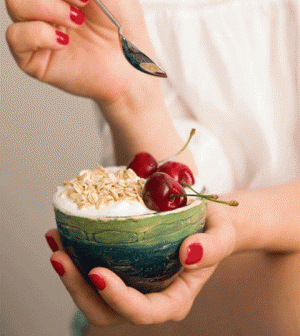- Finding Unshakable Power in a World That Wants to Pull Us ApartPosted 6 months ago
- What could a Donald Trump presidency mean for abortion rights?Posted 6 months ago
- Financial Empowerment: The Game-Changer for Women in Relationships and BeyondPosted 7 months ago
- Mental Health and Wellbeing Tips During and After PregnancyPosted 7 months ago
- Fall Renewal: Step outside your Comfort Zone & Experience Vibrant ChangePosted 7 months ago
- Women Entrepreneurs Need Support SystemsPosted 7 months ago
Prebiotic vs. Probiotic: Do You Know The Difference?

By Lisa Tsakos from NaturallySavvy.com
The terms “probiotic” and “prebiotic” show up frequently on food labels, television commercials, and in health articles.
It is apparent they are associated with good health, but most people don’t know the difference between them or what they really are.
Probiotics
Probiotics are foods and supplements containing the beneficial bacterial cultures to help the body’s naturally occurring intestinal flora re-establish themselves. Hundreds of bacterial strains inhabit the human colon. Some are more important (and much more beneficial) than others. The strains currently living in one’s colon are largely determined by one’s diet. Sugar and an excess of simple starches (like white bread) encourage the spread of unhealthy intestinal microorganisms. Reducing these foods and introducing probiotic foods helps maintain a healthy balance.
Human studies show that regular use of probiotic foods or supplements can aid the digestion of foods (particularly milk and dairy products) and improve the overall state of the colon, treat diarrhea, irritable bowel syndrome, and candidiasis. Additionally, probiotics (and prebiotics, as you’ll learn) enhance mineral absorption, reduce cholesterol (by breaking down bile in the colon and inhibiting its re-absorption into the blood), and strengthen the immune system.
The best known example of a probiotic food is yogurt. Other fermented foods containing similar bacteria include: pickled vegetables, tempeh, miso, kefir, kombucha, sauerkraut, and soy sauce. Include these foods in your diet regularly. Lactic acid bacteria are the most common types of probiotics available in supplement form. The most widely used strains are Lactobacillus and Bifidobacterium. They can convert sugars (including lactose, or milk sugar) into lactic acid. The fermentation gives yogurt its sour taste and provides the health benefits probiotics are known for. Probiotic supplements are recommended after a course of antibiotics and are part of the treatment for candidiasis.
Prebiotics
Prebiotics are undigestible plant fibers that feed the beneficial microflora (probiotics) living in the large intestine, helping them to grow and thrive. The key prebiotics are fructooligosaccharides (FOS) and galactooligosaccharide, both short-chained carbohydrates known as oligosaccharides. A current trend is to add prebiotics to foods for added health benefits.
You’ve probably noticed inulin – a type of soluble fiber and a prebiotic – listed on food labels for yogurt, breads, pasta, cereals and many other foods, including pet food. Inulin cannot be digested by human digestive enzymes and reaches the large intestine intact, making it an excellent fiber source. In addition to its prebiotic effects, inulin’s soluble fibers help to bind cholesterol, excess fat and hormones (like estrogen) removing them from the body via the stool. Inulin is usually extracted from chicory root but is also found in Jerusalem artichoke, jicama, onions, asparagus, raw oats, unrefined wheat, and barley.
Both probiotics and prebiotics are important for good intestinal health. Whether they derived from natural foods, supplements or both, be sure to include them as a regular part of your diet.
 Lisa Tsakos has been in her own practice for over 15 years and specializes in weight management. She teaches natural nutrition in both corporate and educational environments and is a shining example of someone who practices what she teaches.
Lisa Tsakos has been in her own practice for over 15 years and specializes in weight management. She teaches natural nutrition in both corporate and educational environments and is a shining example of someone who practices what she teaches.
Lisa is a nutritionist and educator specializing in weight management. After losing weight several years ago through a more natural diet and by improving her digestion, she committed to sharing her new-found knowledge and returned to school to study nutrition. Over the past decade, her Nu-Vitality Weight Program has helped employees at numerous corporations lose thousands of pounds.
In addition, Lisa regularly consults for groups and individuals with unique nutritional needs such as police officers and athletes. Lisa has been featured on the Discovery Channel, numerous radio programs and is a contributor to various publications. Additionally, she teaches nutrition at multiple post-secondary schools, has taught natural food cooking workshops, and authored two books.






